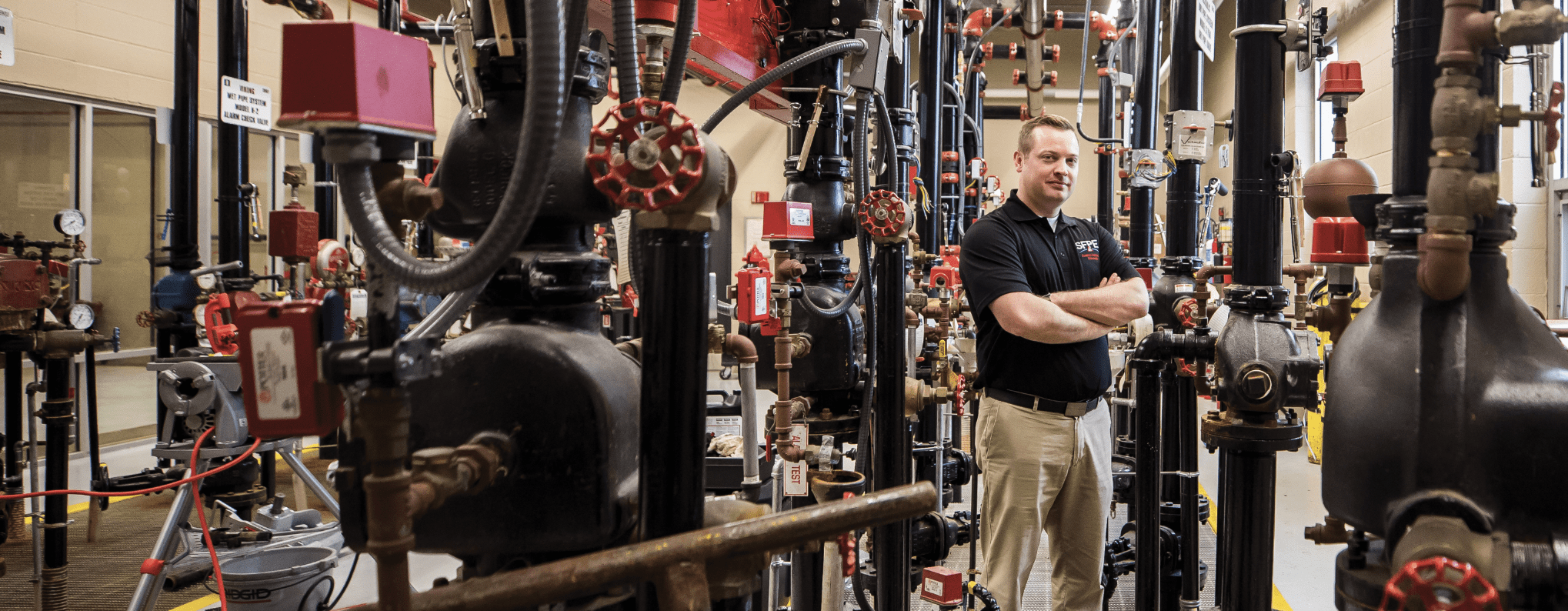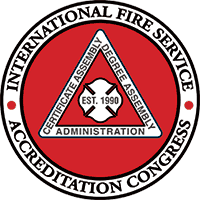
Program Overview
The Fire Protection and Safety Engineering Technology Bachelor’s Degree provides students with comprehensive knowledge on using engineering technology methods to protect life and property within the built environment from fires and explosions. Accredited by the Accreditation Board for Engineering and Technology (ABET), this degree program includes courses on the specification, design, installation, operation, testing, and maintenance of fire protection systems and structures. The combination of hands-on and classroom instruction provides students with the necessary knowledge and skills to be leaders in the fire protection field.
Fire protection and safety engineering technologies experts save lives and money by preventing fires, and reducing the danger when fires do break out. They provide advice that helps people safely design buildings and products, prevent fires and extinguish or escape from fires. Many also inspect buildings and homes to determine the amount of fire danger that is present and suggest ways to minimize this danger.
Visit eku.edu/fireandsafety for more information.
Accredited By:
The Fire Protection and Safety Engineering Technology bachelor’s degree is accredited by the Engineering Technology Accreditation Commission of ABET and the International Fire Service Accreditation Congress (IFSAC).


Career Opportunities
- Fire Protection and Prevention Systems Designer
- Building Inspector
- Fire Safety Director
- Insurance Company Consultant
- Industrial Safety Specialist
- Fire Protection Consultant
- Fire Protection Technician
Bachelor’s Degree
Total Curriculum Requirements: 120 hours
37 hours: Gen. Ed./University Requirements
42 hours: Fire and Safety Requirements
41 hours: Supporting Course Requirements
Minor
18 hours
Grade of “C” or better required
FSE 120, 221, 224, 355, 445, 480
Nine Hours must be upper division.
Course Descriptions
FSE 101 Fire Prevention
An introduction to fire and safety related codes, fire prevention methods, mechanical systems and engineering solutions for hazards. An in-depth look at the Life Safety Code, and the function and testing of fire related building components.
FSE 120 Fire Behavior and Combustion
Introduction to the chemistry and dynamics of fire, including basic terminology and concepts that are applied to the physical and chemical properties of the development and spread of fire in a structure, hazardous materials and the Computer Fire Analysis.
FSE 201 Building Construction
A review of the analysis of building construction methods and terminology. A systems approach to designing building fire safety; the Life Safety Code; the function of and testing of rated building components, evaluating plans for code compliance.
FSE 221 Fire Protection Systems
Introduction to fire detection, protection, control systems and extinguishment. Fixed and portable systems of the following types will be studied: automatic sprinklers, standpipes, dry chemical, foam, halogenated agents, fire alarm systems, and diction.
FSE 224 Human Behavior in Fire
Examine current and past research on human behavior, system models, life safety education, and building design to determine interactions in emergency situations. Develop a best practice building life safety system.
FSE 300W Technical Report Writing for Emergency Services.
Develop oral and written communication skills specific to the public emergency service sector’s needs. Focusing on the technical aspects involved in supporting public initiatives operating within the legal system and learning the specific requirements for submitting documentation to various technical committees. Credit will not be awarded to students who have credit for FSE 300 and 300W.
FSE 305 Hazardous Materials
Study of hazardous material problems in transportation, storage and use. Chemical properties relating to specific reactions, engineering controls and control in and emergency situation. Emphasis on the role of pre-emergency planning, combating, coordinating, and controlling a hazardous materials incident.
FSE 322 Fire Protection Structures and System Design
Analysis and evaluation of specific code requirements related to the design, inspection, testing, and maintenance of fire protection systems. Design project will be included.
FSE 349 A-N Cooperative Study: Fire and Safety Engineering
Work in placements related to academic studies. One to eight hours credit per semester or summer. Total hours: eight, associate; sixteen, baccalaureate. A minimum of 80 hours employment required for each semester hour credit.
FSE 350 Fire, Arson and Explosion Investigation
An in-depth study in the analysis of fire, arson, and explosion scenes. Emphasis will be placed on the principles and techniques of scene preservation and analysis, management of investigative function, documentation of the scene, and determination of the cause and origin of fire.
FSE 355 Fire Dynamics
An introduction to fire-related measurement techniques, advanced fire and combustion concepts, and associated terminology. This course includes basic numerical methods for understanding fire dynamics.
FSE 360 Fire Protection Hydraulics and Water Supply
A study of water at rest and in motion, Bernoulli’s and Pascal’s theorems, water distribution systems, velocity, friction loss, and pump and nozzle pressures required for fire protection.
FSE 445 Advanced Structural Fire Protection
Examines principles involved in structural fire protection: behavior of materials and design considerations for each material in regards to a structure’s design under fire attack and resistive protection methods
FSE 480 Industrial Fire Safety
Fire scenario analyses for industrial installations using test data, loss experience and simplified theoretical modeling focusing on warehousing, storage of flammable liquids, and safety of electrical equipment and computers.
FSE 481 Fire Protection Design
Comprehensive project emphasizing a team approach to the design process. Problem formulation, project management, drawings and specifications, cost estimating, and various project components.
Information based on EKU’s 2023/2024 course catalog and is subject to change.
Information based on EKU’s 2023/2024 course catalog and is subject to change.